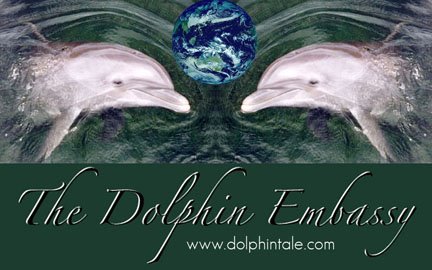
Underwater among the dolphins, we find ourselves to be the clumsy ones, the ones who do not belong here, but have come for visit. We stare, wide-eyed, at the grace and weightless power of the dolphins as they spin, turn, flip over, and proceed in a new direction before we could tell they were going elsewhere.
They glide and turn, the smallest flicker of their pectoral fins guiding them into a new pattern, a weaving of balance and freedom and desire, their goals fleeting, their aims simple.
We are among Elders, beings who live as one with their world, adjusting their very flexible selves to whatever comes their way.
They communicate their ideas quickly, so quickly. Above our hearing, far above mostly, they whistle and click to each other, offering suggestions and comments to each other -- or do they? What do we know of the content of their communication?
When we study closely the communication of the dolphins, we find that they can respond well to whatever we ask them to, whether it be counting, memory games, sorting words into correct order to accomplish complex tasks, or giving each other instructions on how to do something the other has not ever done before. They can do whatever we ask of them. Yet we do not know what they talk about among themselves. Since we know they are capable of whatever we imagine for them to try, is it not reasonable to imagine that they can communicate in ways we have not asked of them?
Do they speak with a noun-based language? Or are they mostly useing verbs, the moving actions of life to base their language? Or is it of another order altogether? Perhaps the mysterious languages spoken by initiates of arcane studies, who must constuct whole vocabularies to express their occult knowledge is akin to the dolphin's speech. Do they carry on metaphysical exchanges, telling each other of dimensions unknown to us?
What is the cause of the ease, the sense of gentle peace they radiate so much of the time? Do they know something so well that it leaves them knowing not the unease we seem to live within, but somehow know some of the reasons "why" life is as it is? Do their millions of years of living free in the oceans, mostly without fear, give them a transcendental reality, one of deep and abiding trust?
I wonder many times when among them, how they see us. Their gentle knowing seems so wise, so free of entanglement in our "stories".
They can serve as our teachers if we choose. They can represent The Other, the outside being who sees us and reflects an image of the self back to us, if we approach them with respect.
The Ambassadors




